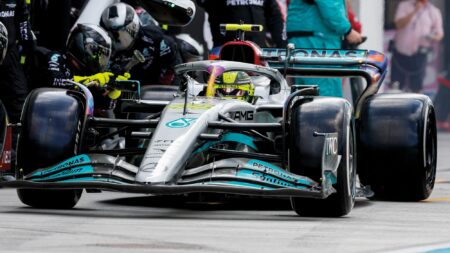
Luck is falling George Russell's way in team-mate battle with Lewis Hamilton
For the second time in three races George Russell was very lucky with the timing of a safety car coming after most of his rivals had pitted but before he…
EDITORIAL NOTES.
Sporting Trials and the Motor Industry. AT the moment there seems to be a considerable amount of controversy concerning the attitude of
certain manufacturers with regard to various trials and competitions. We understand also that some of the older manufacturing firms hold the view that such events should not be supported and even take up a strongly dictatorial attitude in the matter. Every firm is, of course, entitled to hold its own opinions as to the value derived from sporting events in relation to business, but we feel that any suggestion of interfering with the development of types by putting obstacles in the way of competitions, is not only
extremely foolish, but suicidal if this country is to hold its own with the productions of foreign countries, which are continually being improved as the result of very strenuous road and track tests. As far as we are able to judge, it seems that having reached the stage where orders are rolling in in a fairly satisfactory way, some manufacturers are acting very much like the dog in the manger, with the sole object of preventing any newcomers, or small concerns from
developing better machines, which if placed in competition with their own would put up very much better performances. So long as motors run on roads, so long will sporting drivers demand cars of high performance and the dis inclination of any manufacturer to participate in trials will mean that his make will cease to be regarded with favour by a certain section of the buying public. Every
one recognises that the biggest business is to be done in the sale and manufacture of touring models and we ourselves admit the comparatively small proportion of sporting motorists compared with the total number of car owners.
We are equally certain that the sporting driver can and does exercise a good deal of influence in advising his friends who, while not wanting a car to do eighty miles an hour, look to him for advice. Does the touring car business of some of the high class manufacturers stiffer just because they happen to hold a bunch of World’s Records, or a fine collection of trophies won in reliability trials ? We fancy not. On the contrary, it can be proved over and over again that the public regard reliability trials in the way that the organisers intended, namely, to establish the
fact that standard productions are capable of standing up to severe work and thus ensuring satisfaction in the hands of the average user.
Any shirking of responsibilities in keeping performance well before the public notice is a sign of weakness on the part of the manufacturers, camouflage it how they may. At present there is far too much of the trade union spirit in certain sections of the motor industry, and real progress is being hindered by a modified form of Prussianism, which prevents individual firms from opening out into fresh avenues of development for the benefit of the car-buying public. Directly anything new is suggested, the matter is discussed by a species of Third International, and is thus severely handicapped from the start.
Competitive trials are essential to-day in maintaining the standard of automobile efficiency as they were in the days of tube ignition. Considered as advertising propaganda—their least valuable virtue—trials are infinitely superior to impossible looking pictures and imaginative claims set forth in some kinds of publications.
As to the cost of competition work, this is largely a matter of business organisation, and here some of the big firms could learn quite a lot from their humbler rivals, who, with very small amounts of money available, are consistently successful in winning trophy after trophy in open competitions. Or does the success of the mere nobodies in the industry account for the attitude of those who want to rest on their oars ?